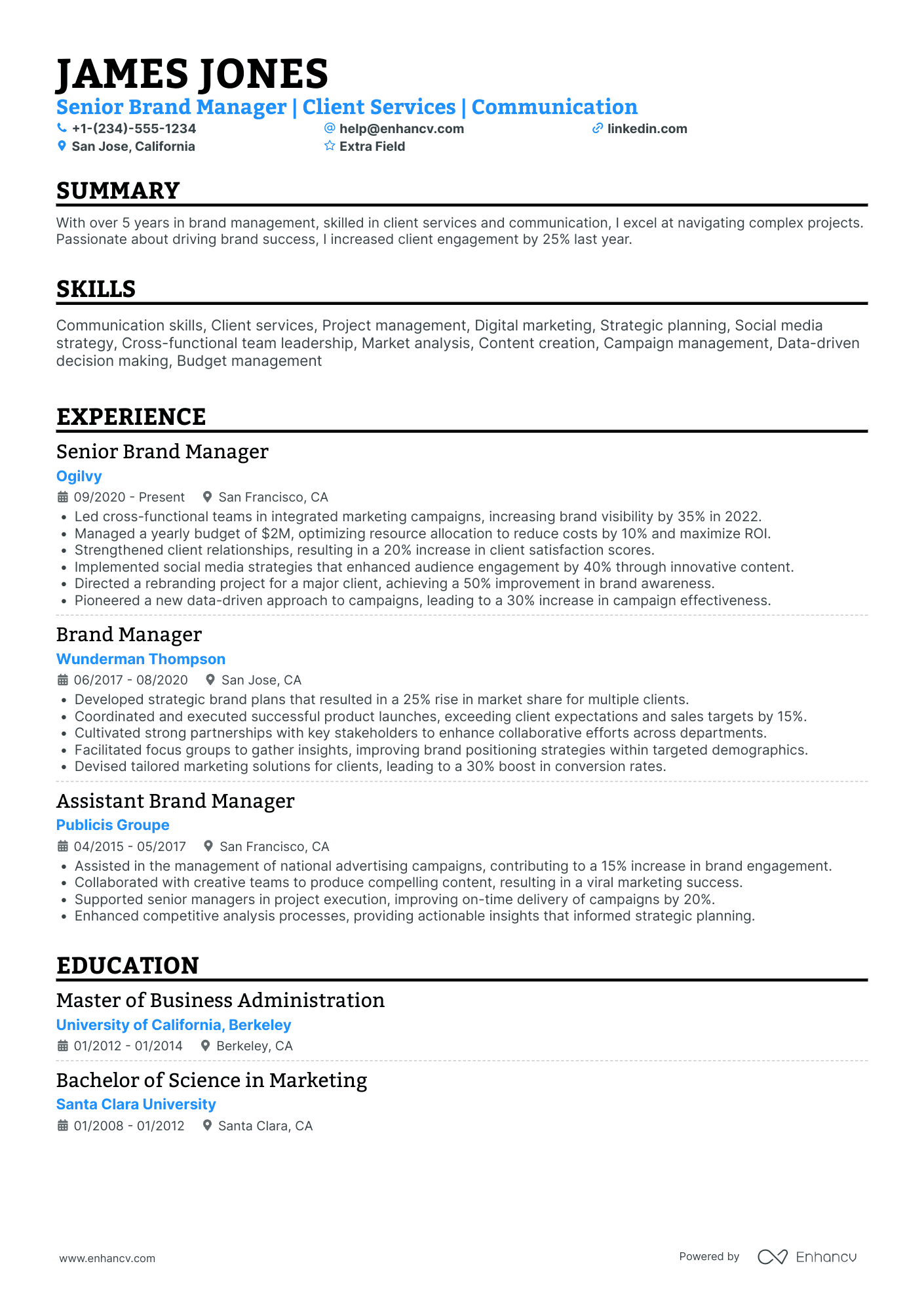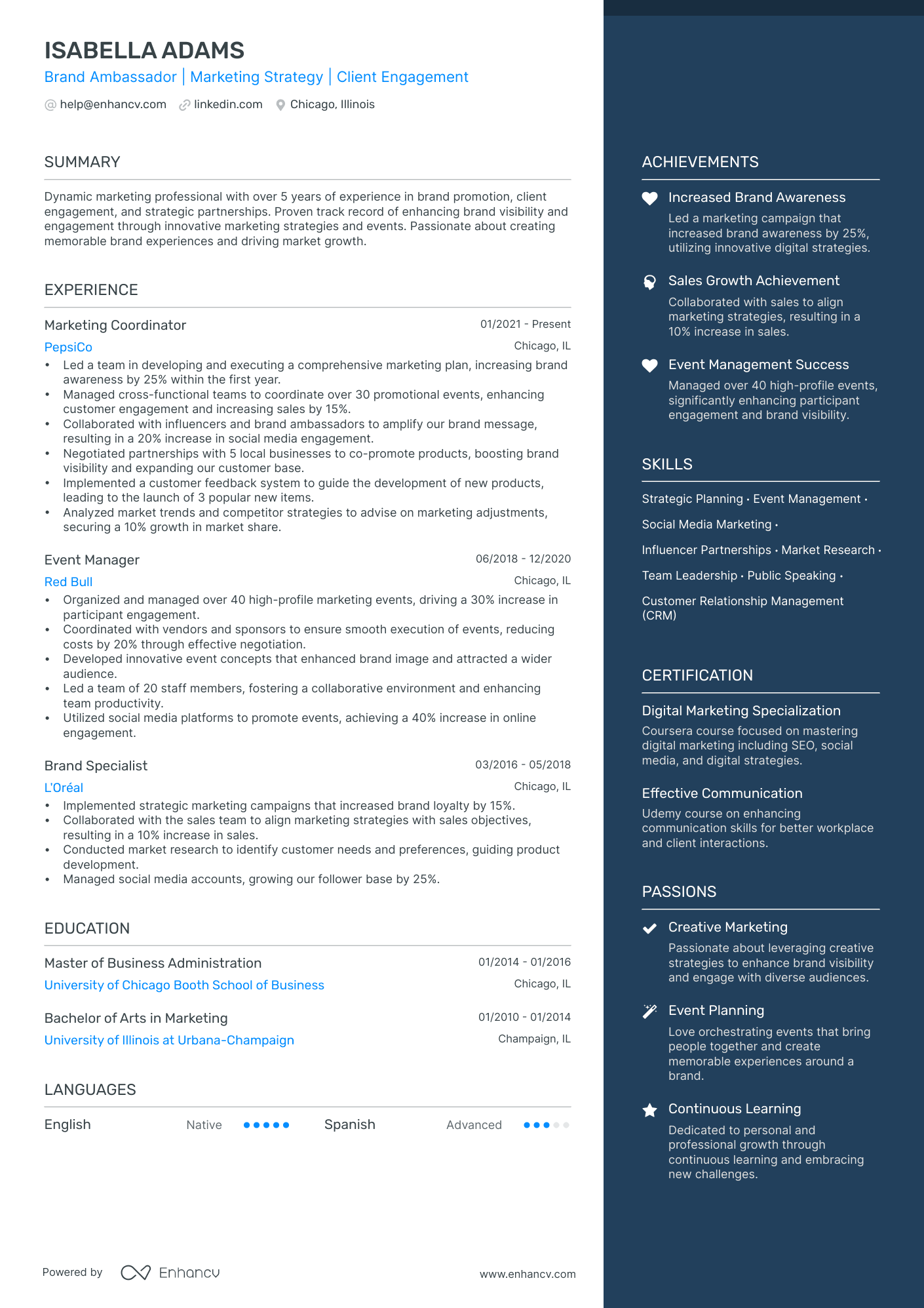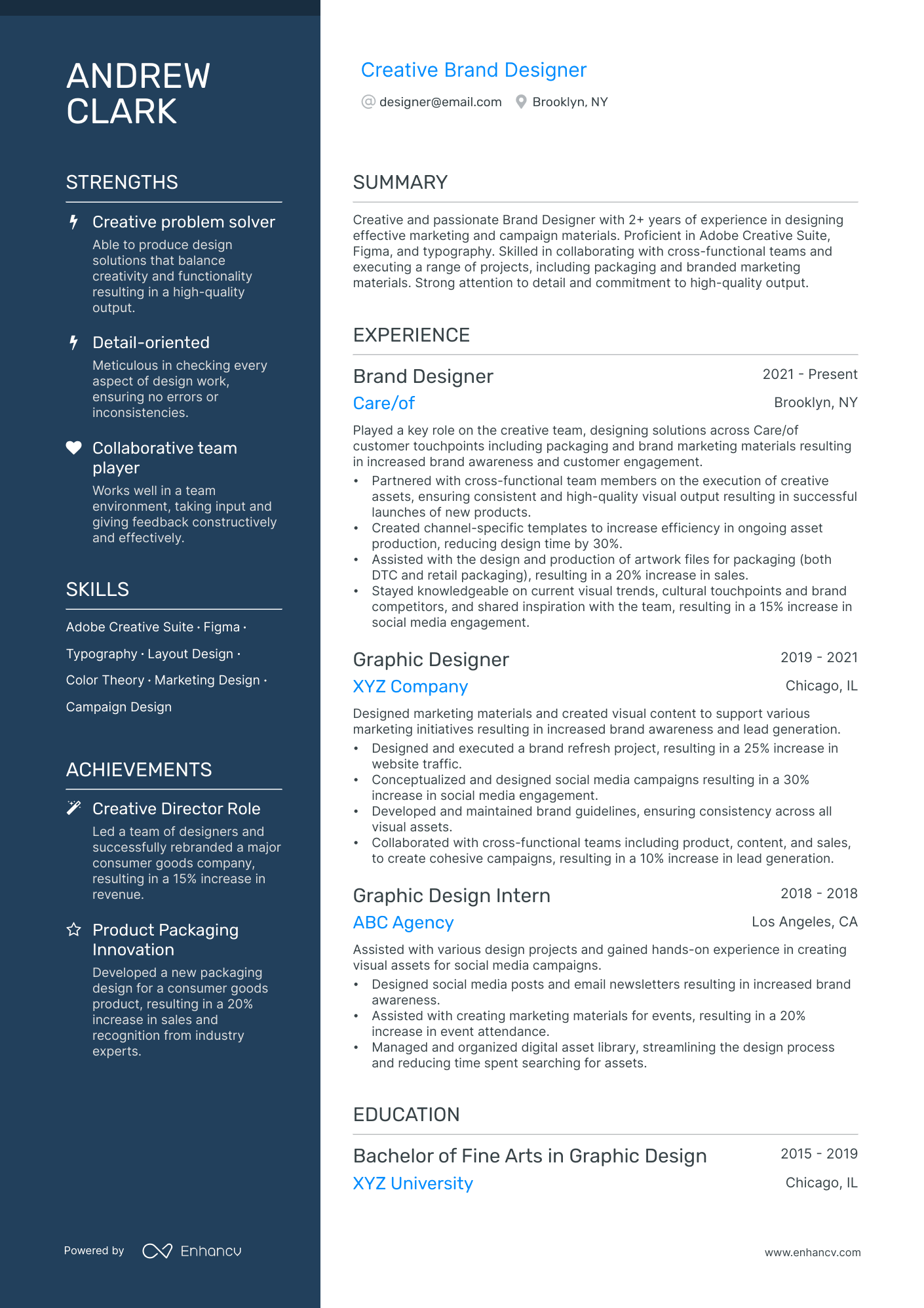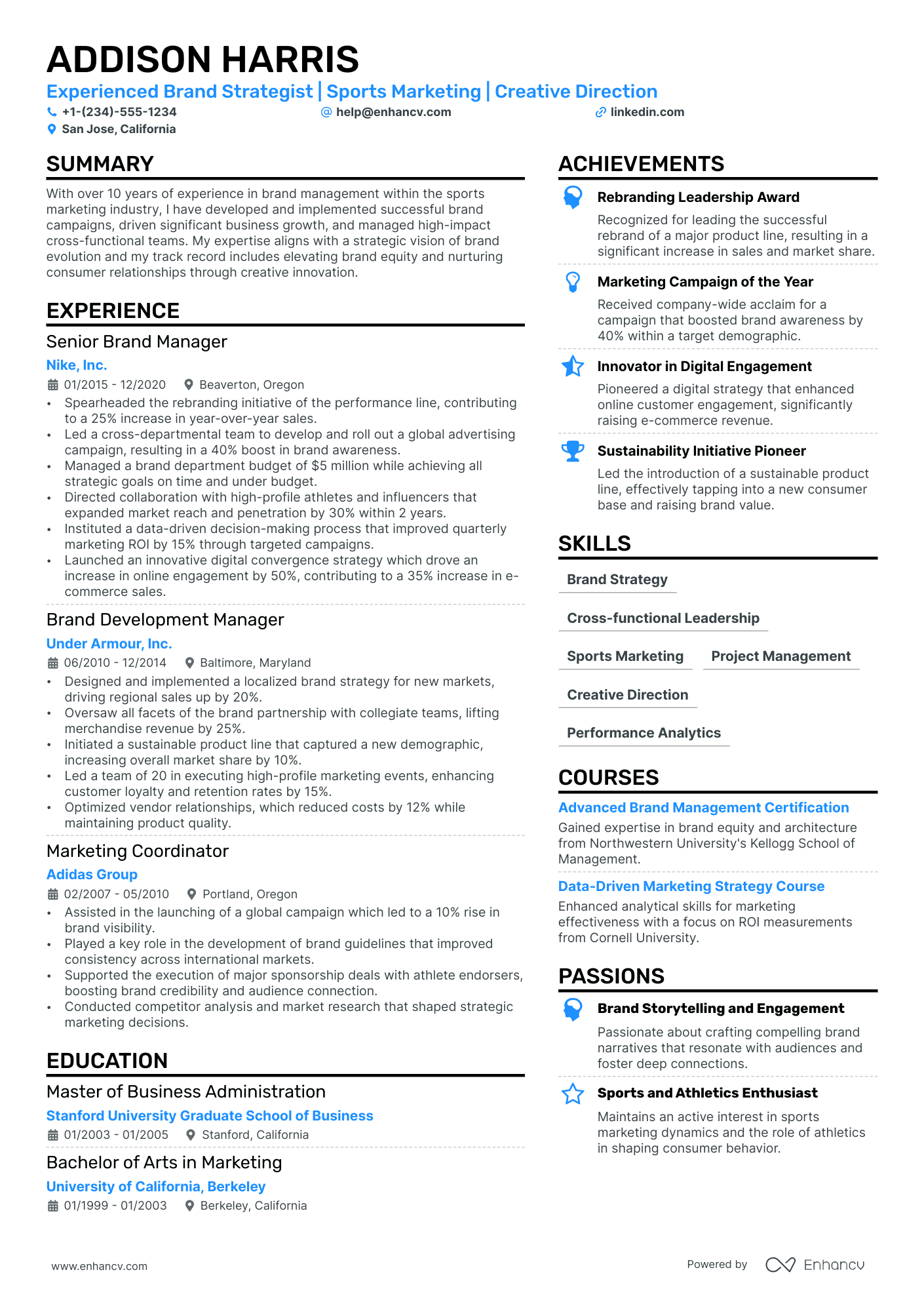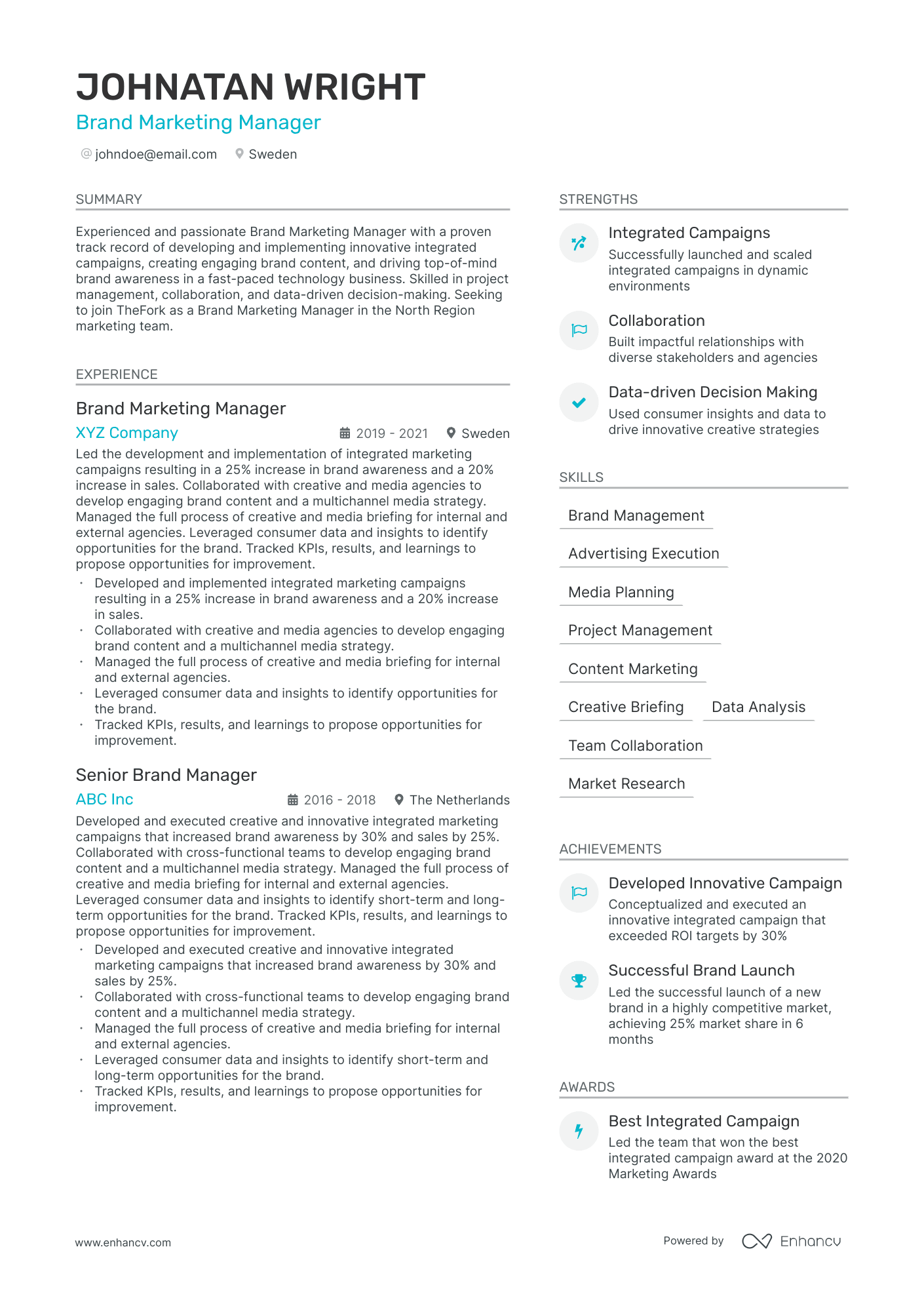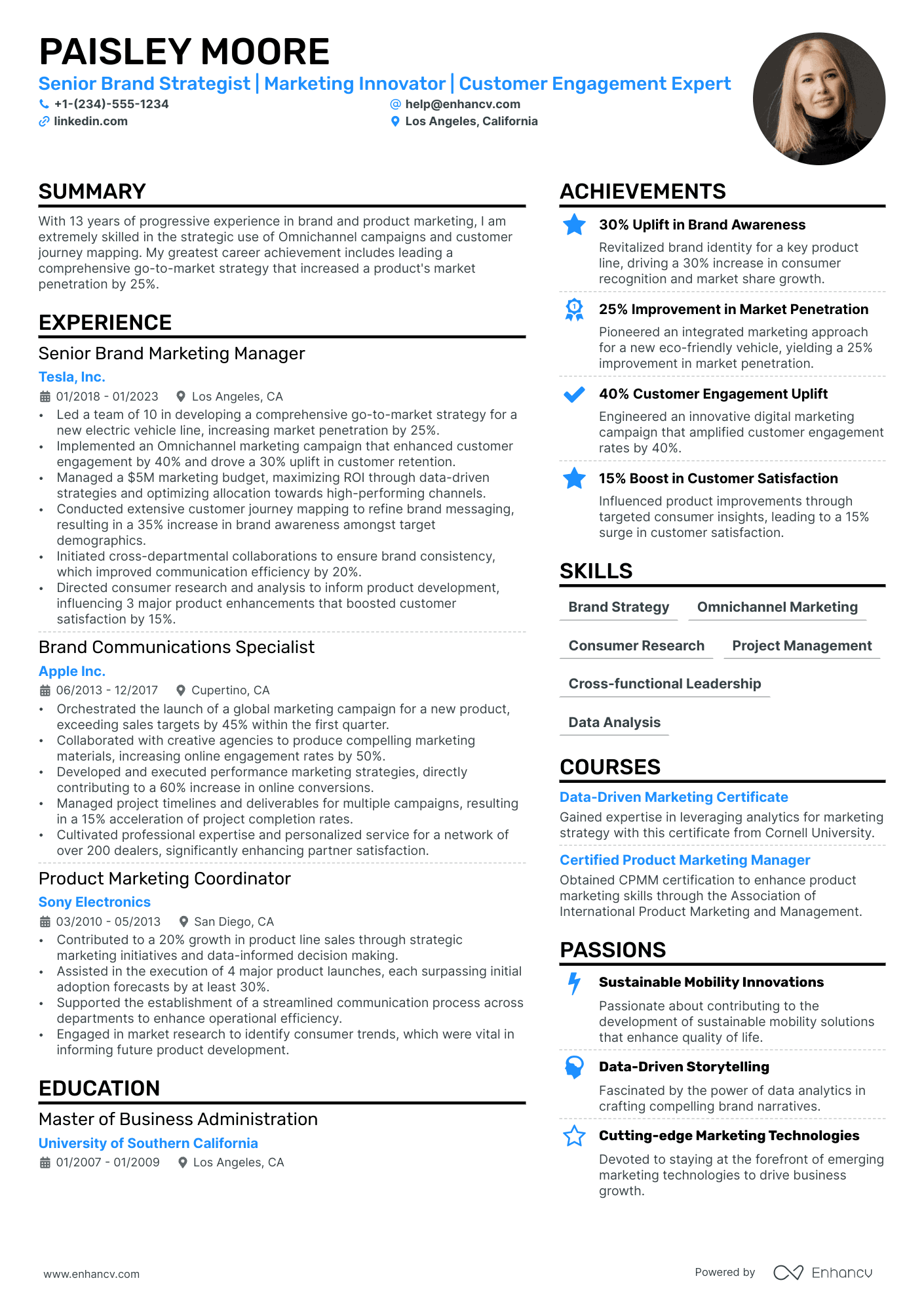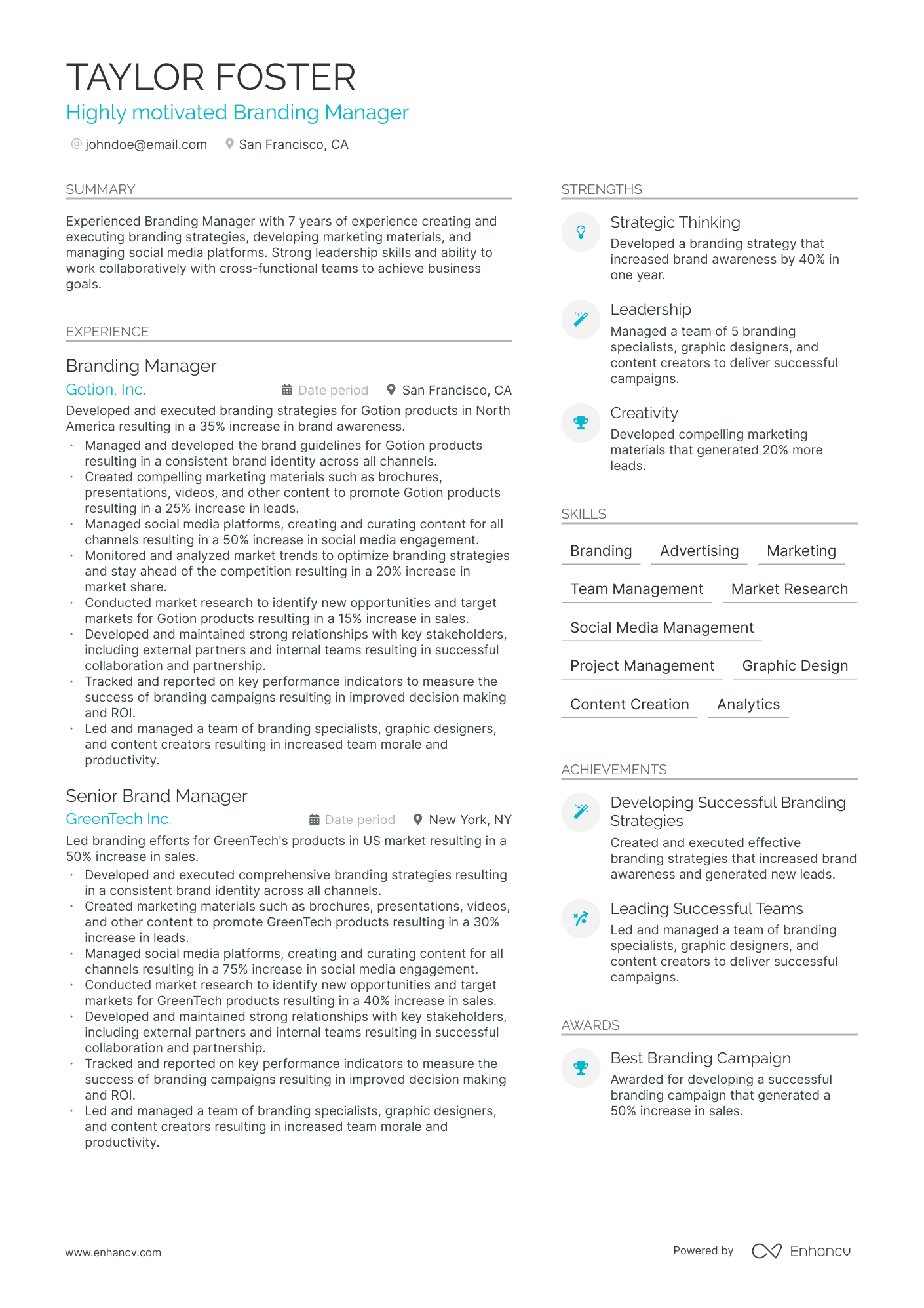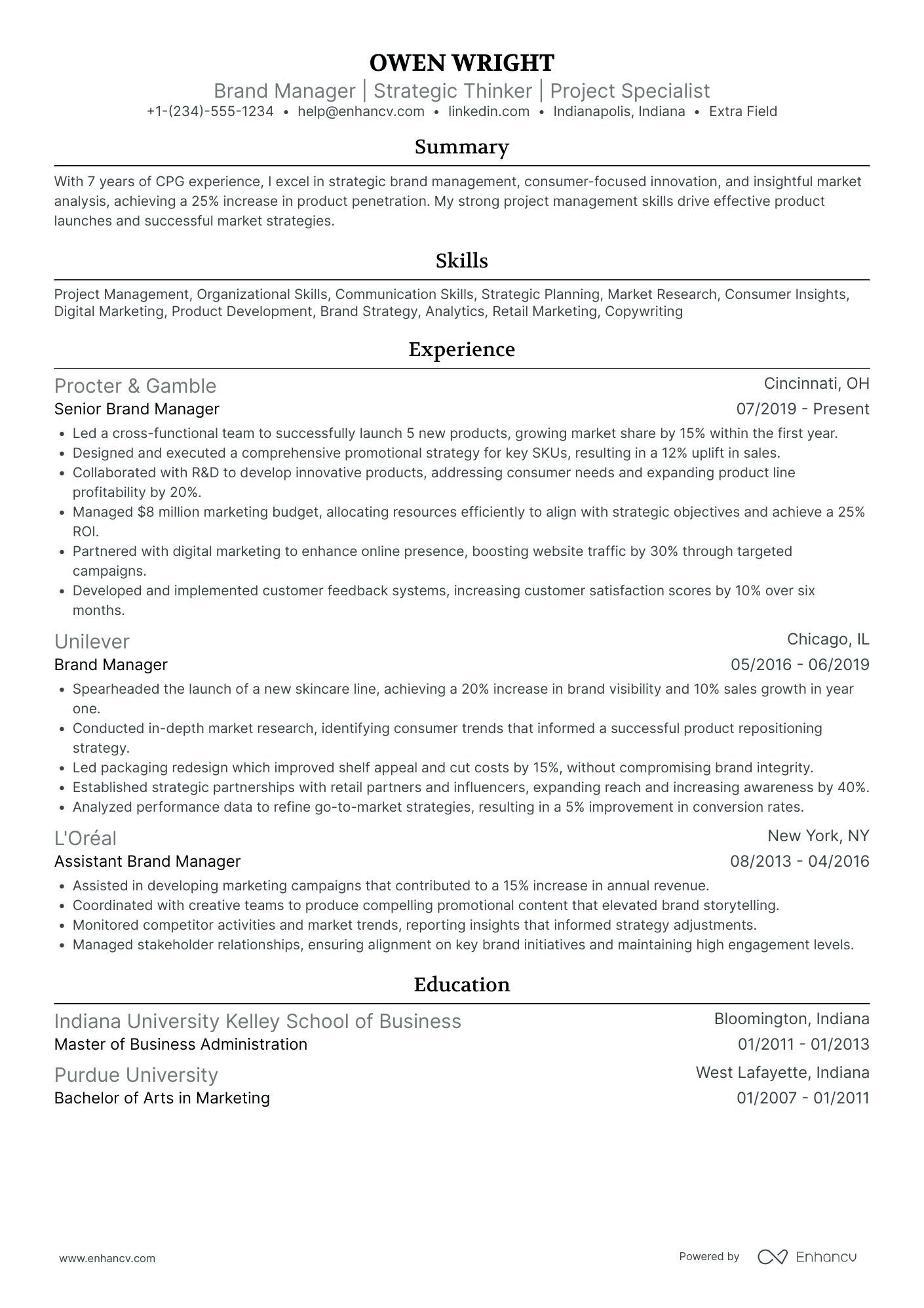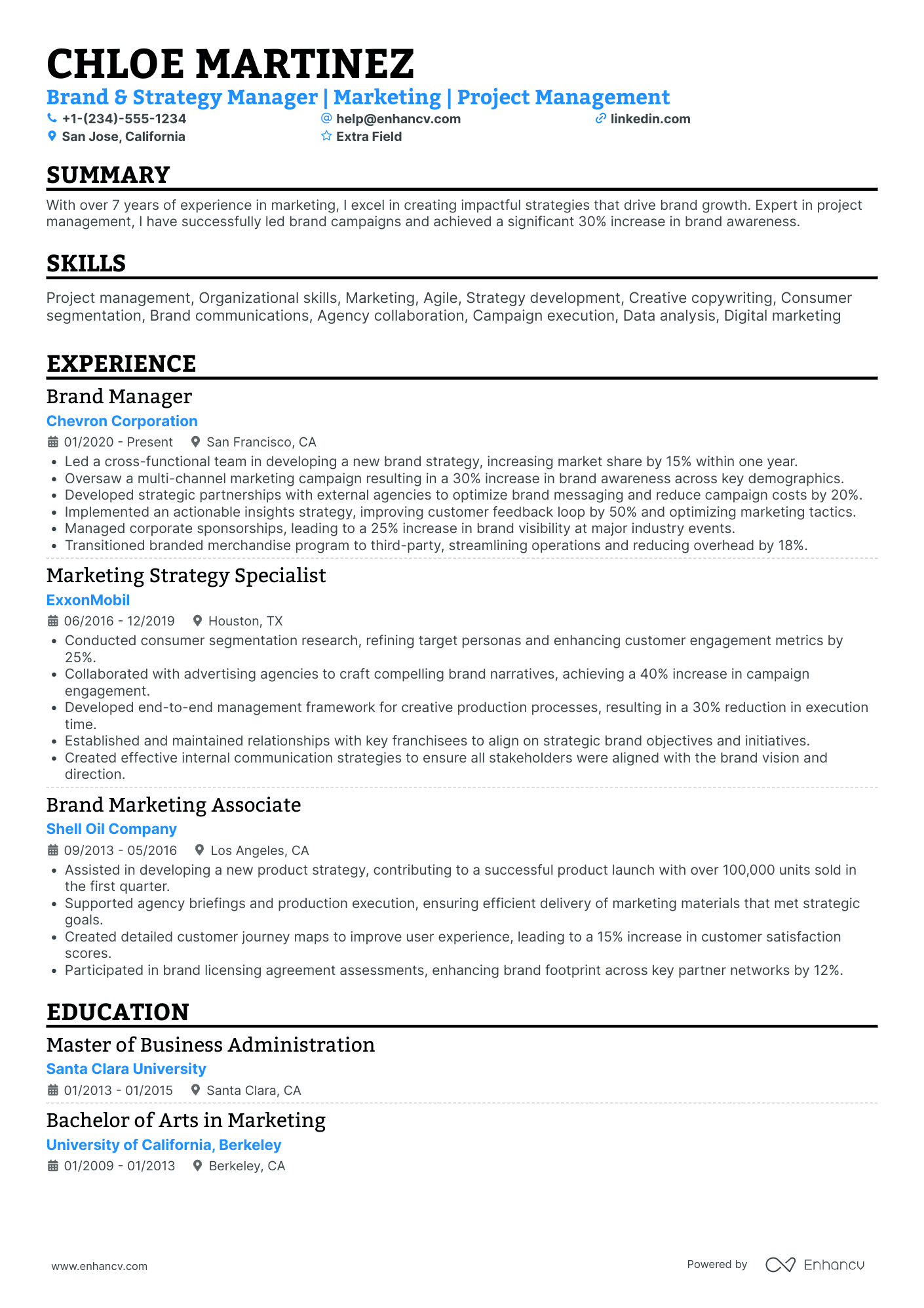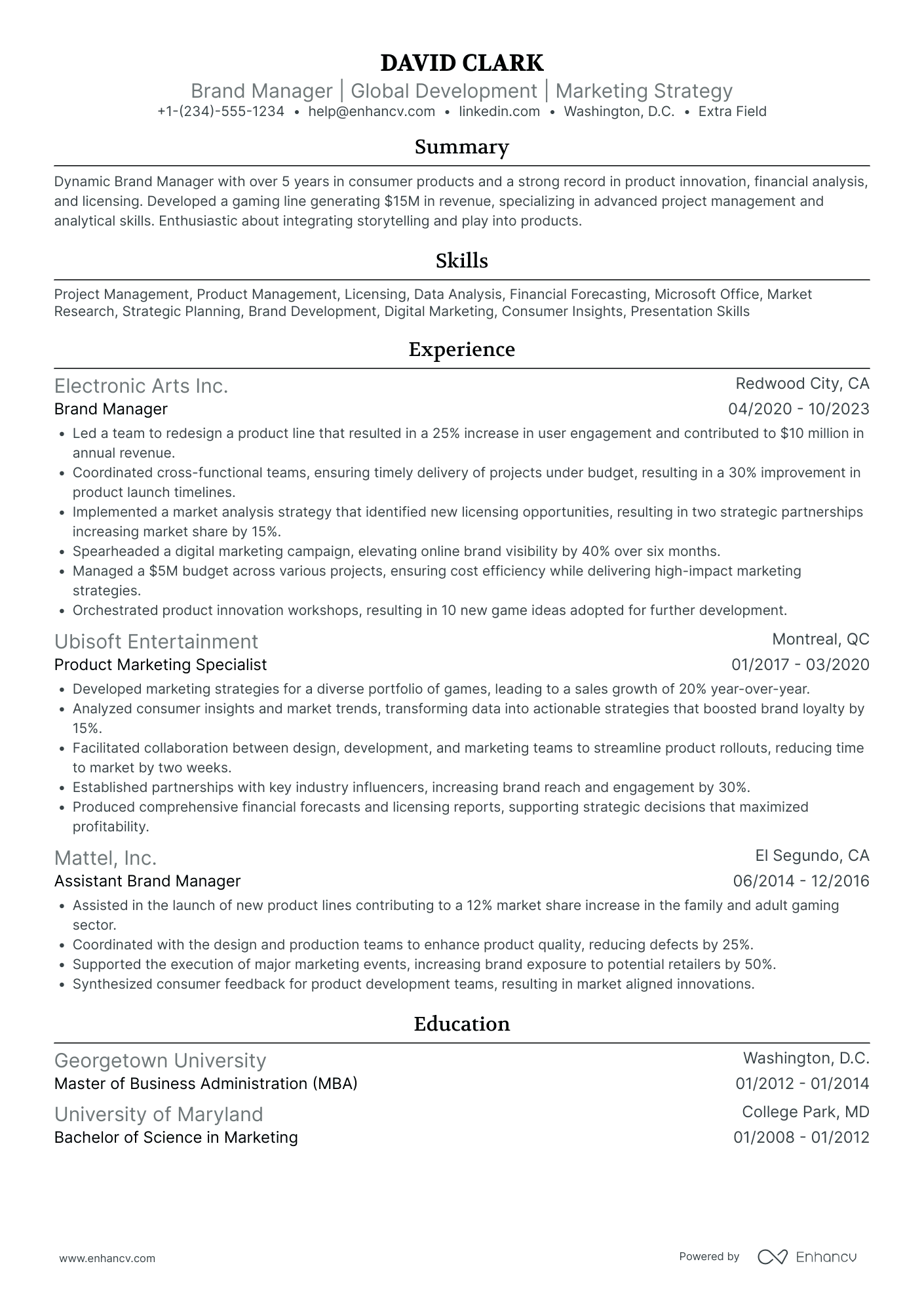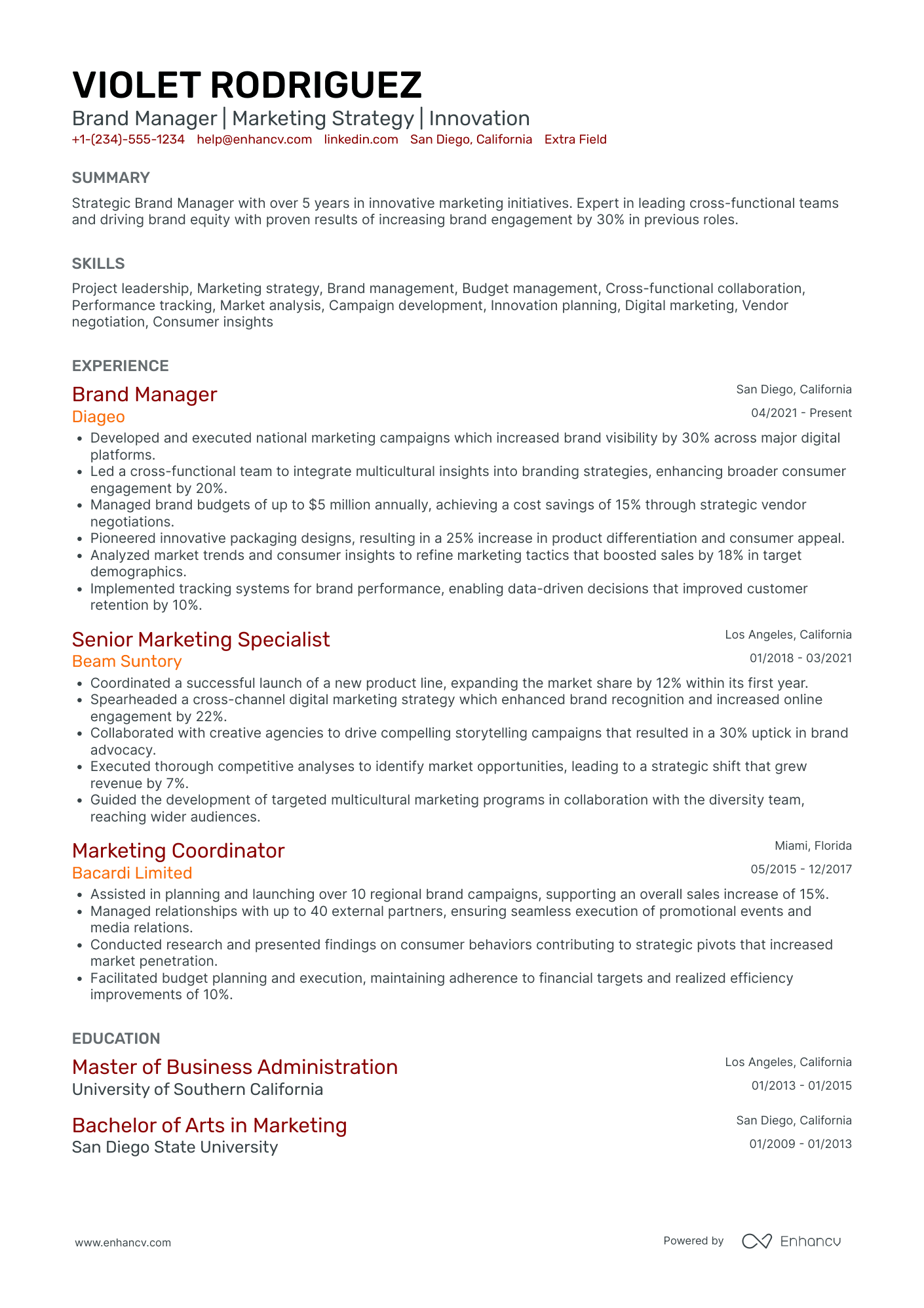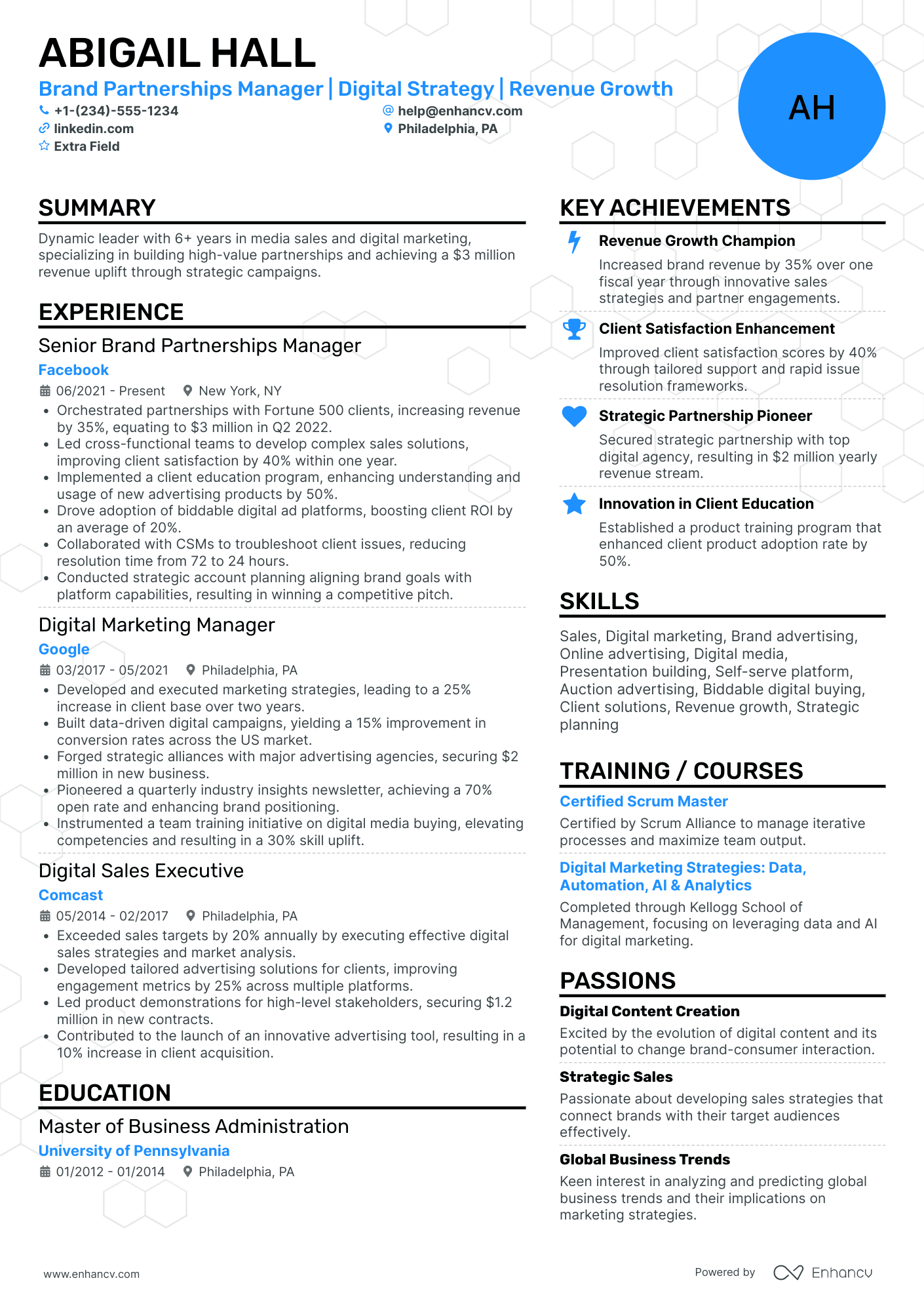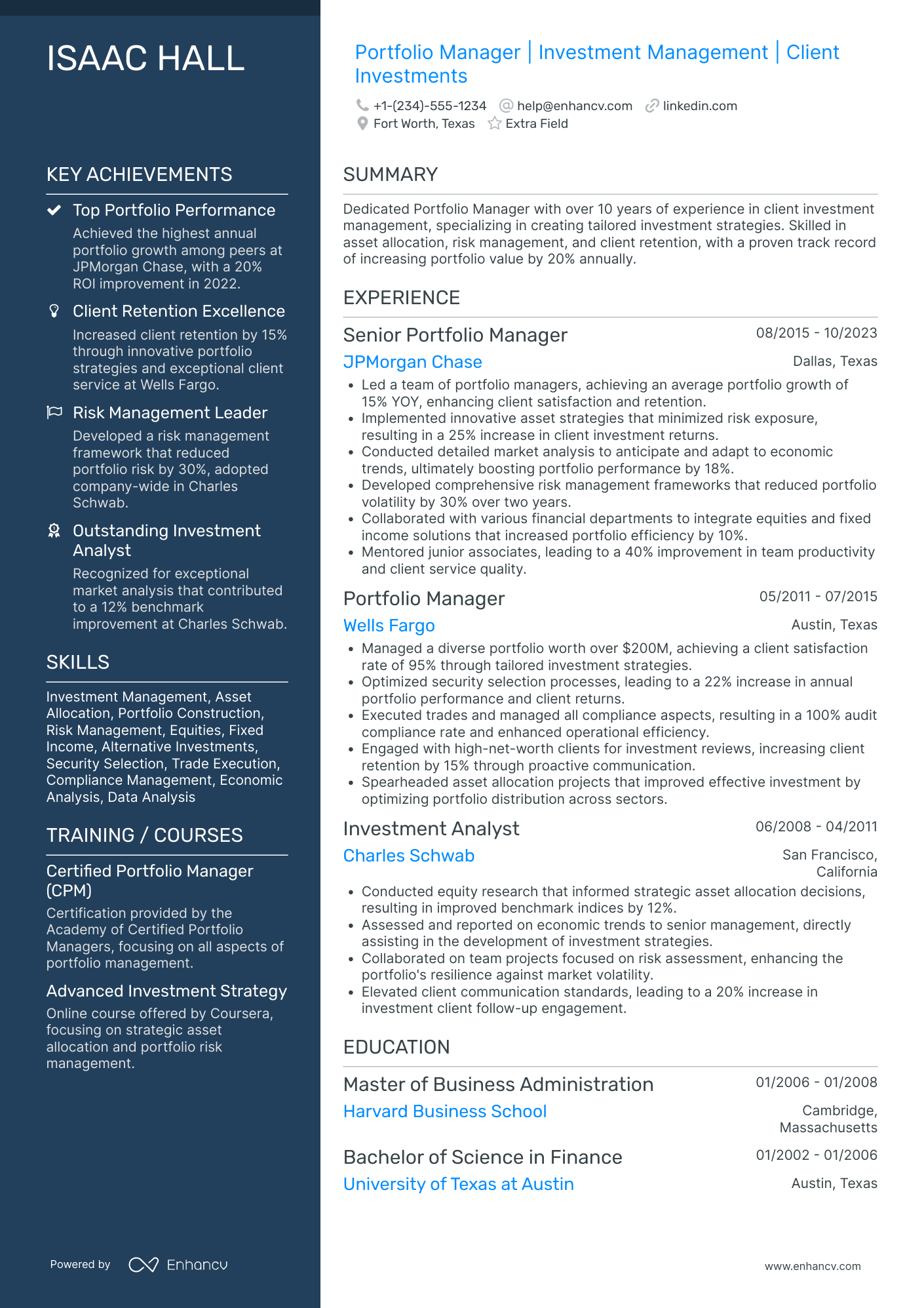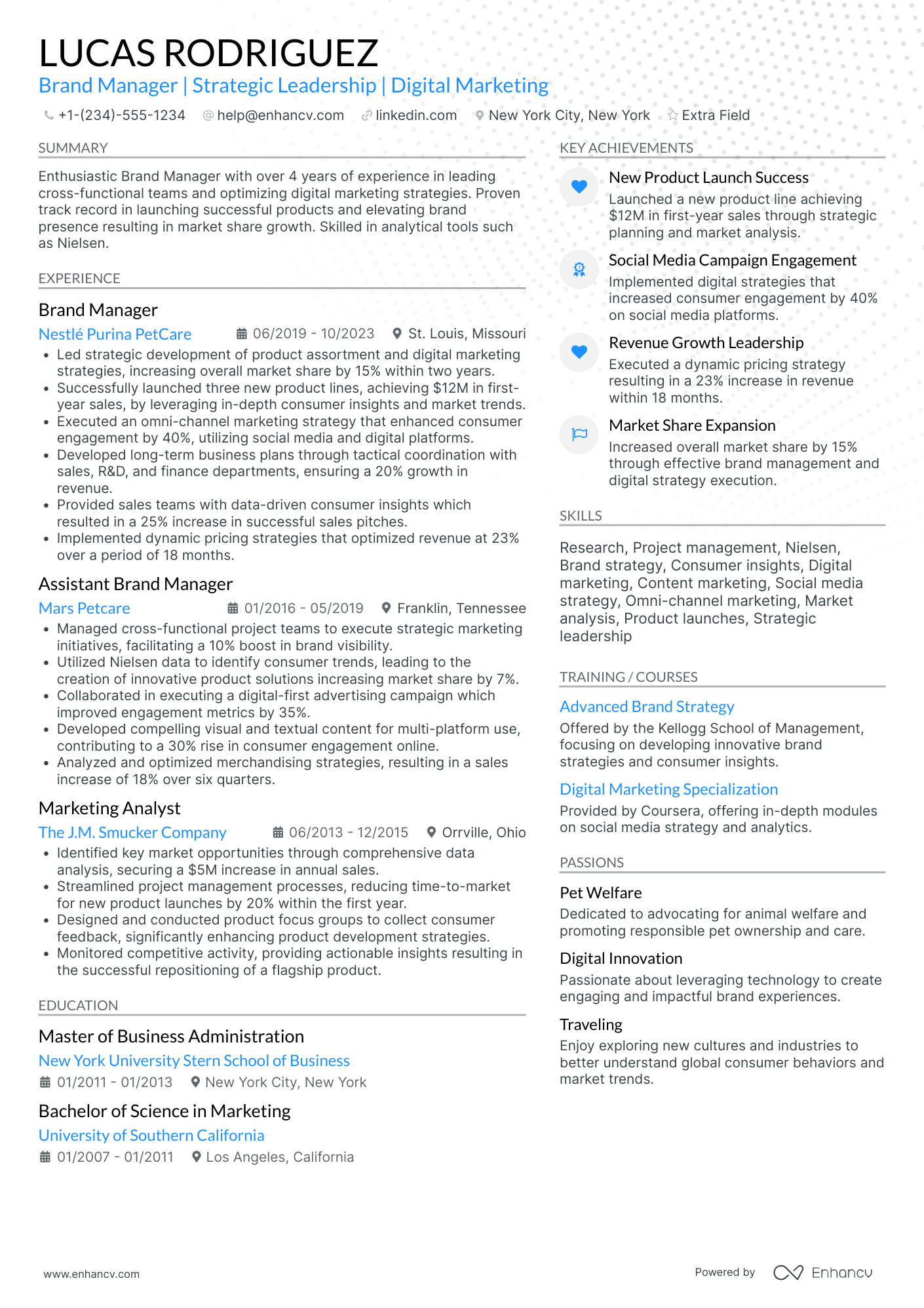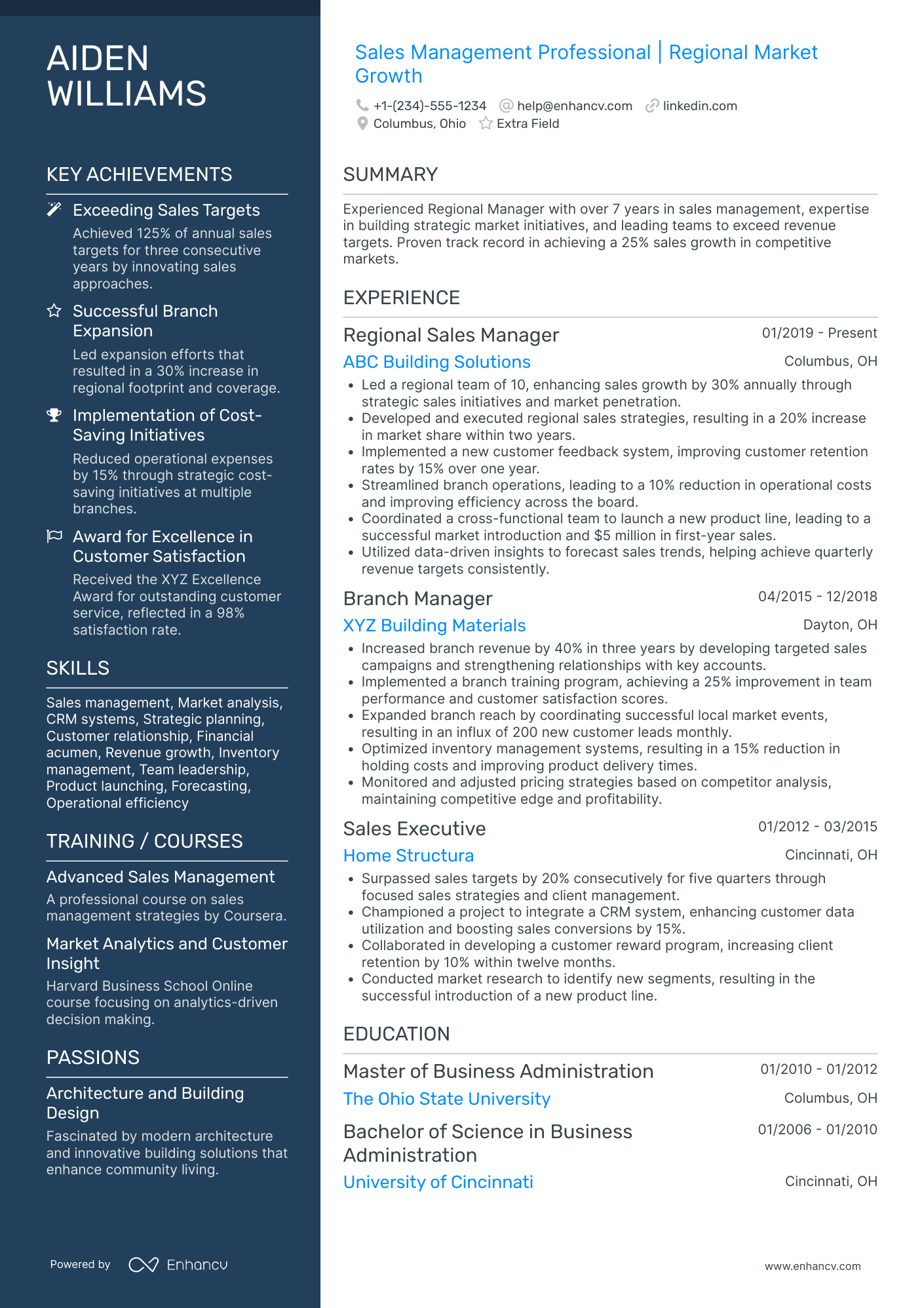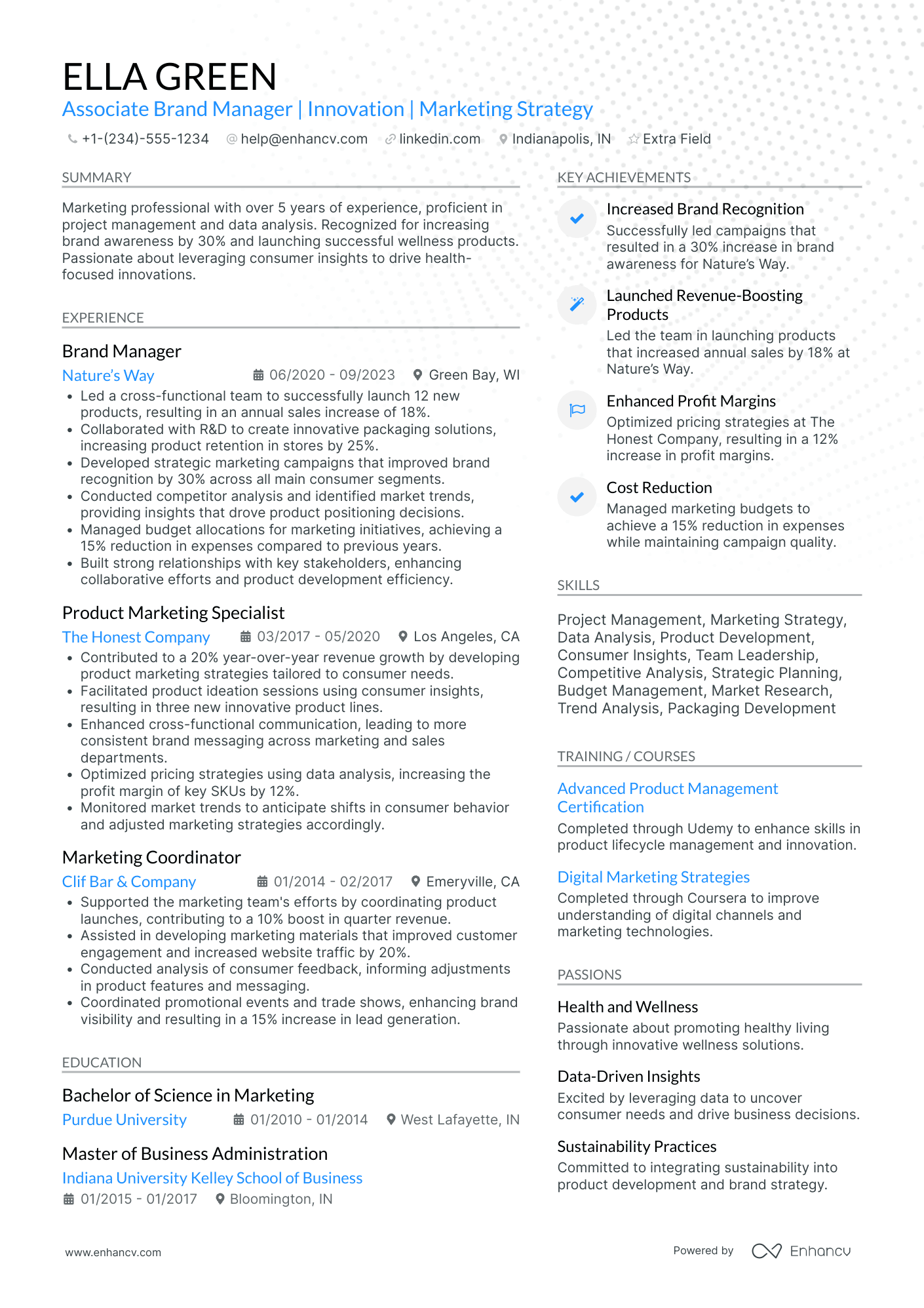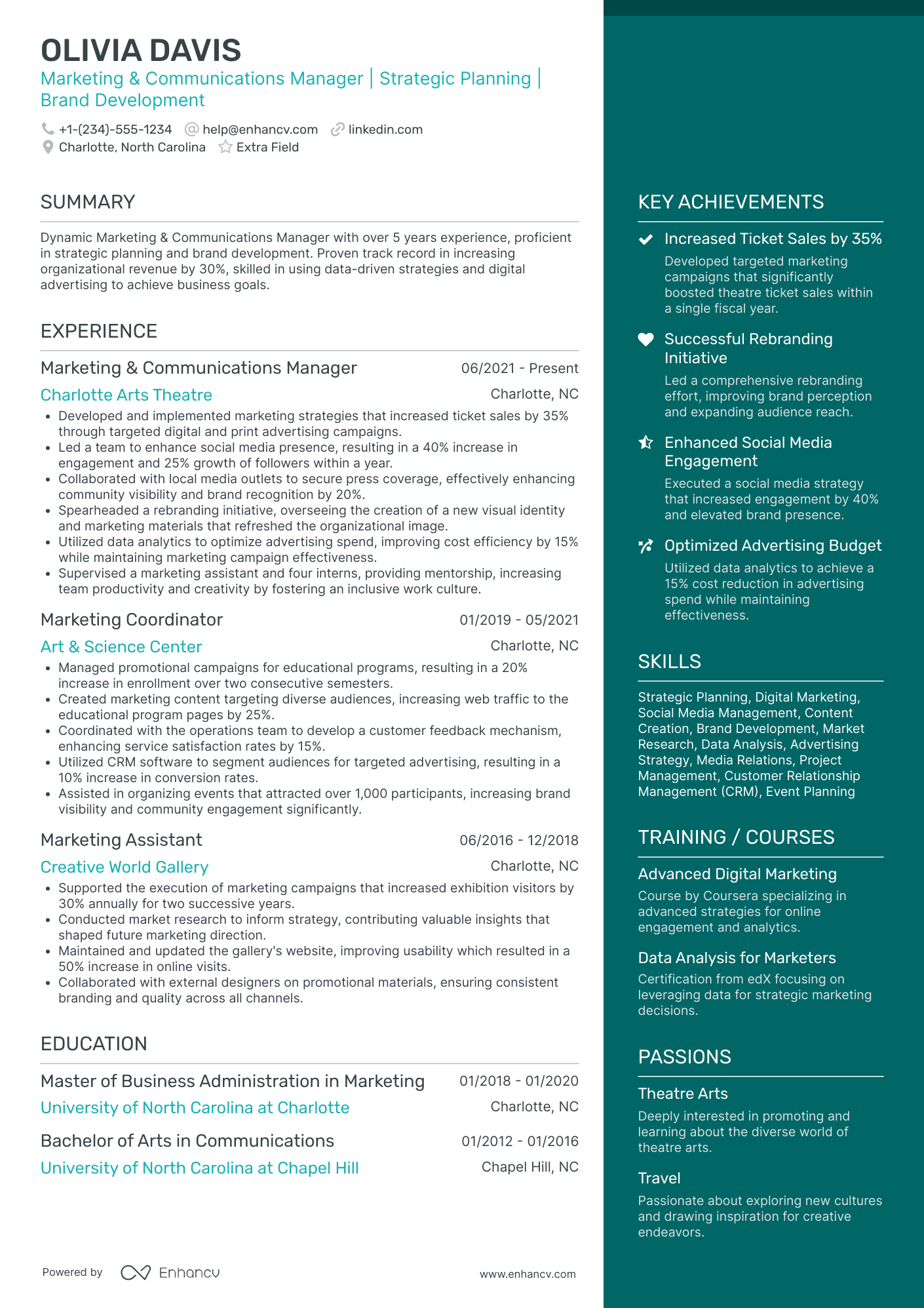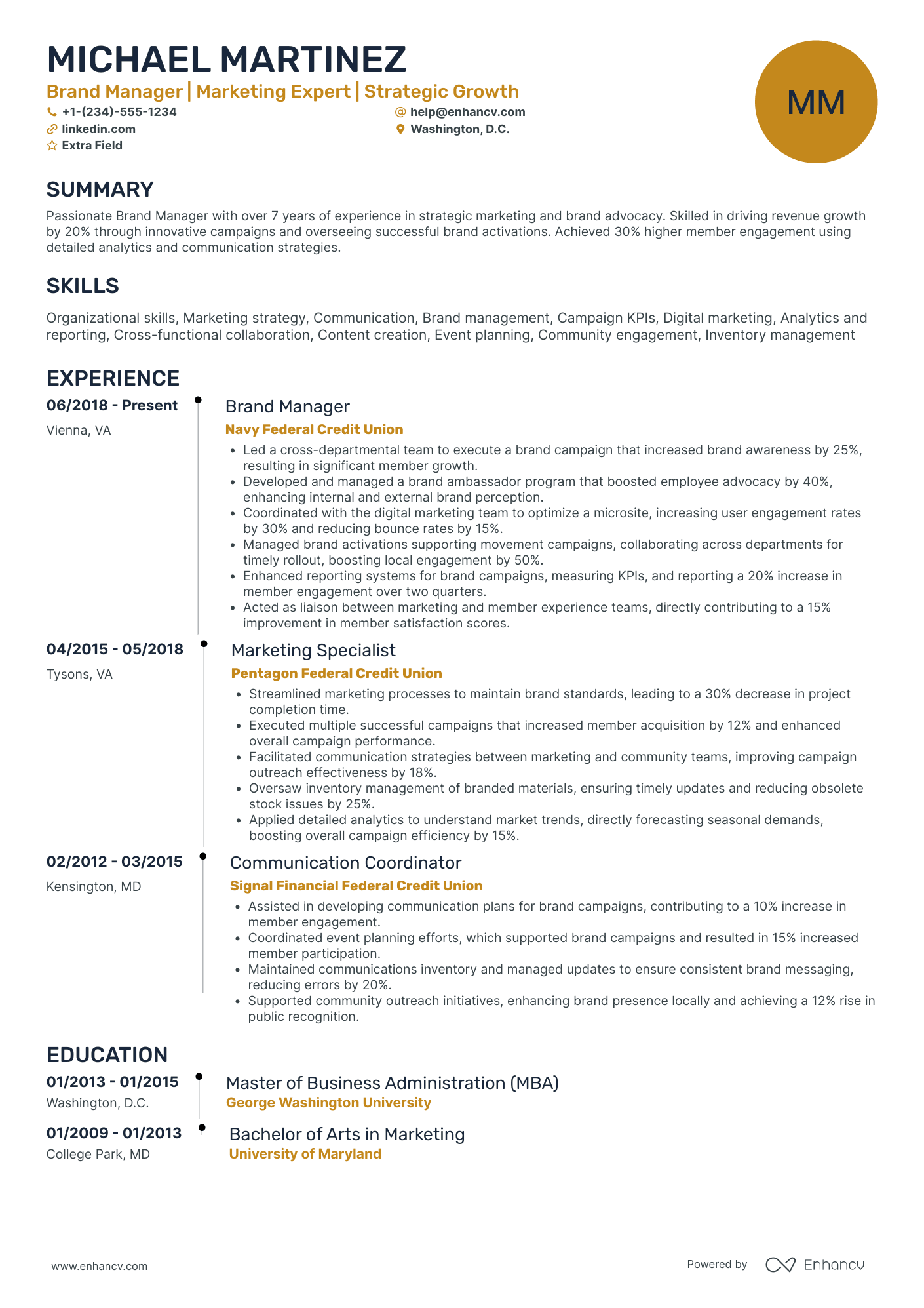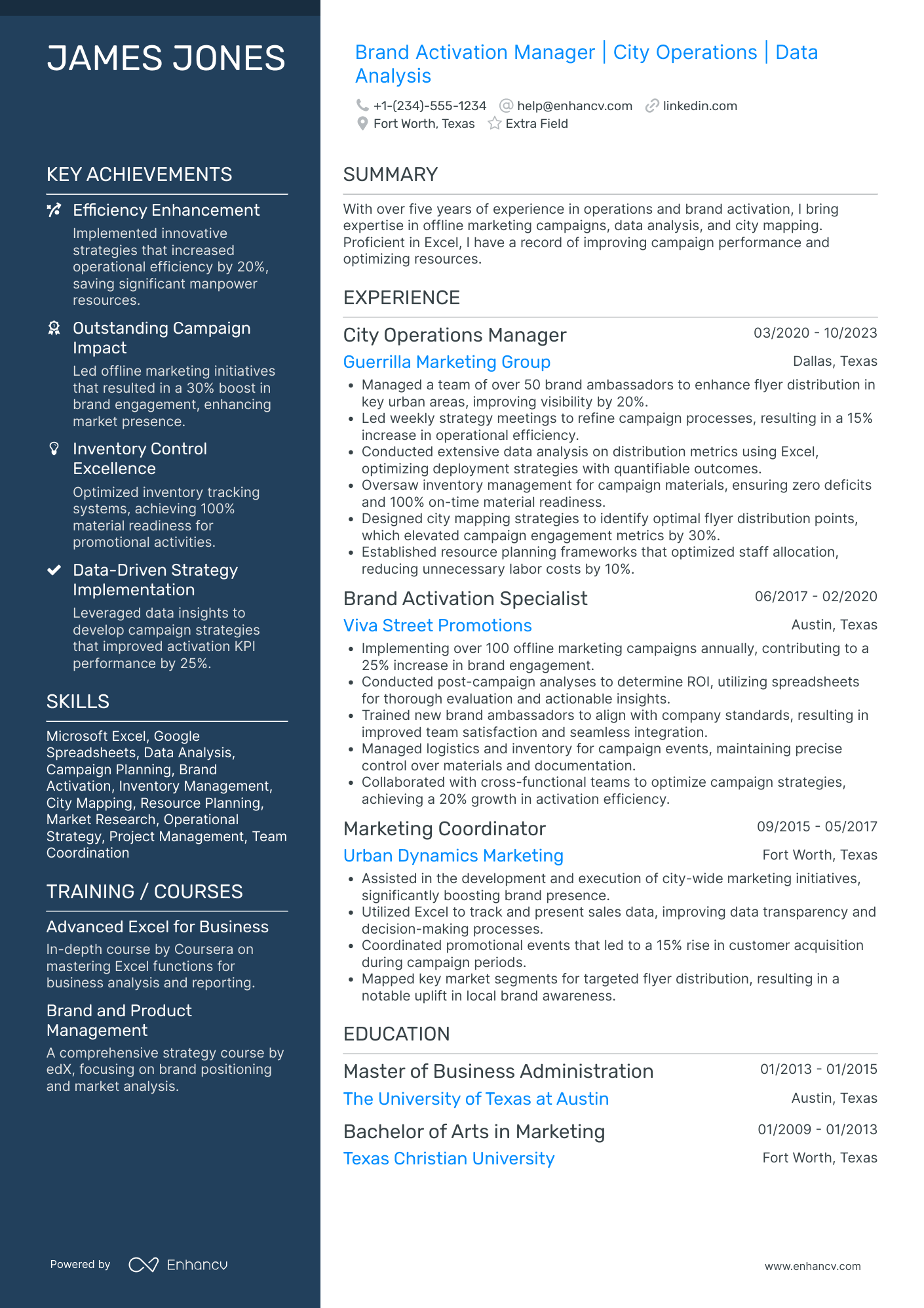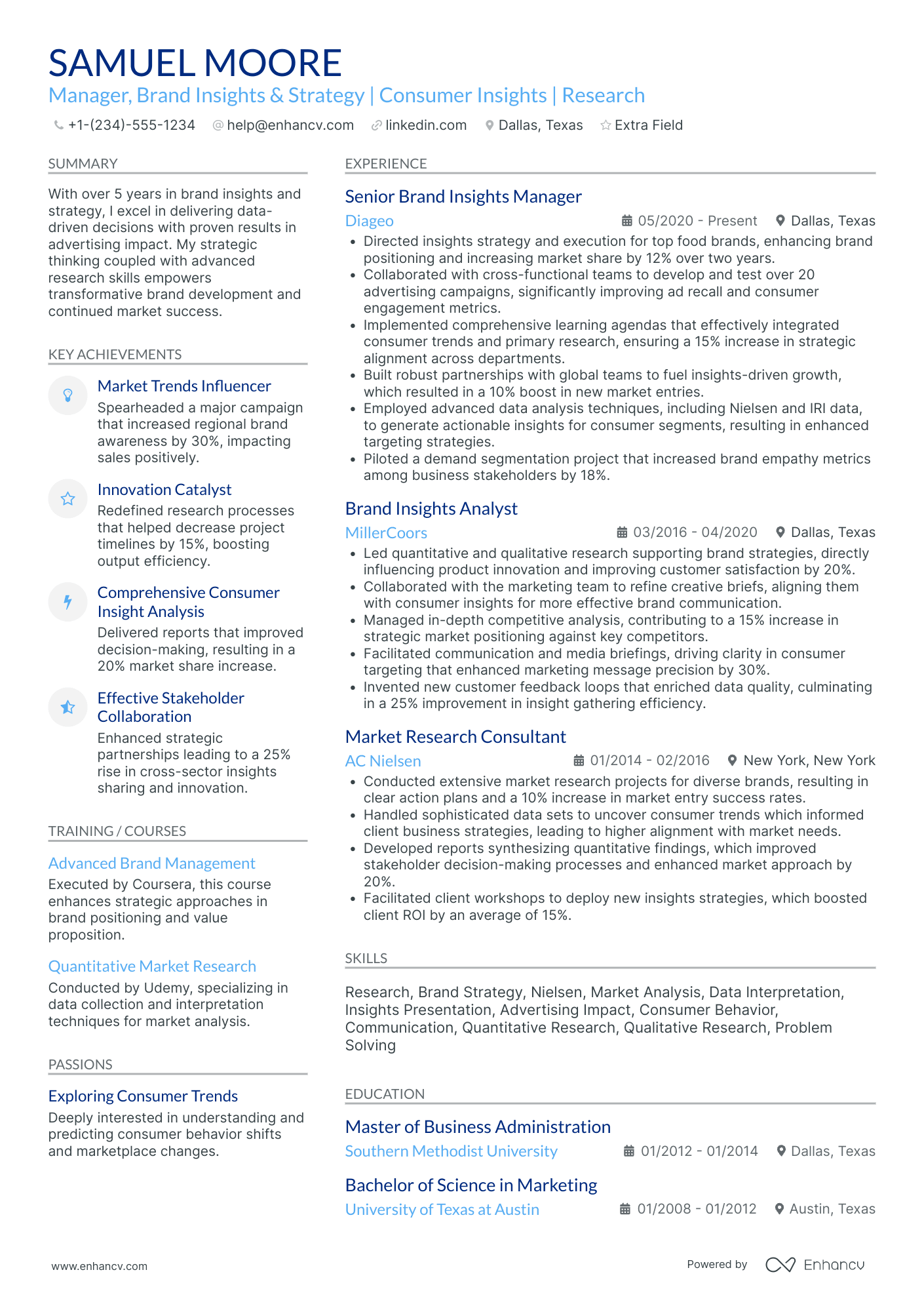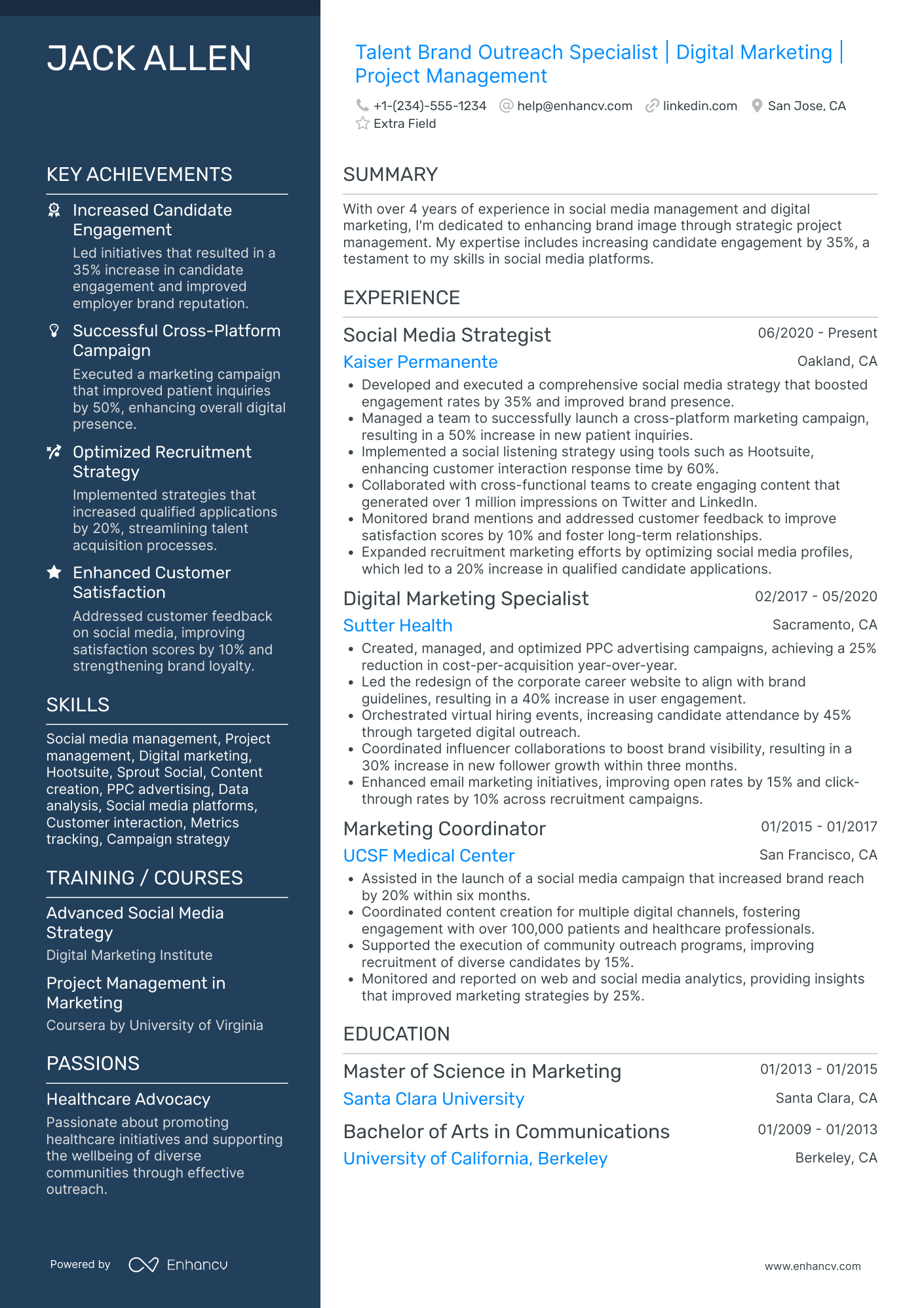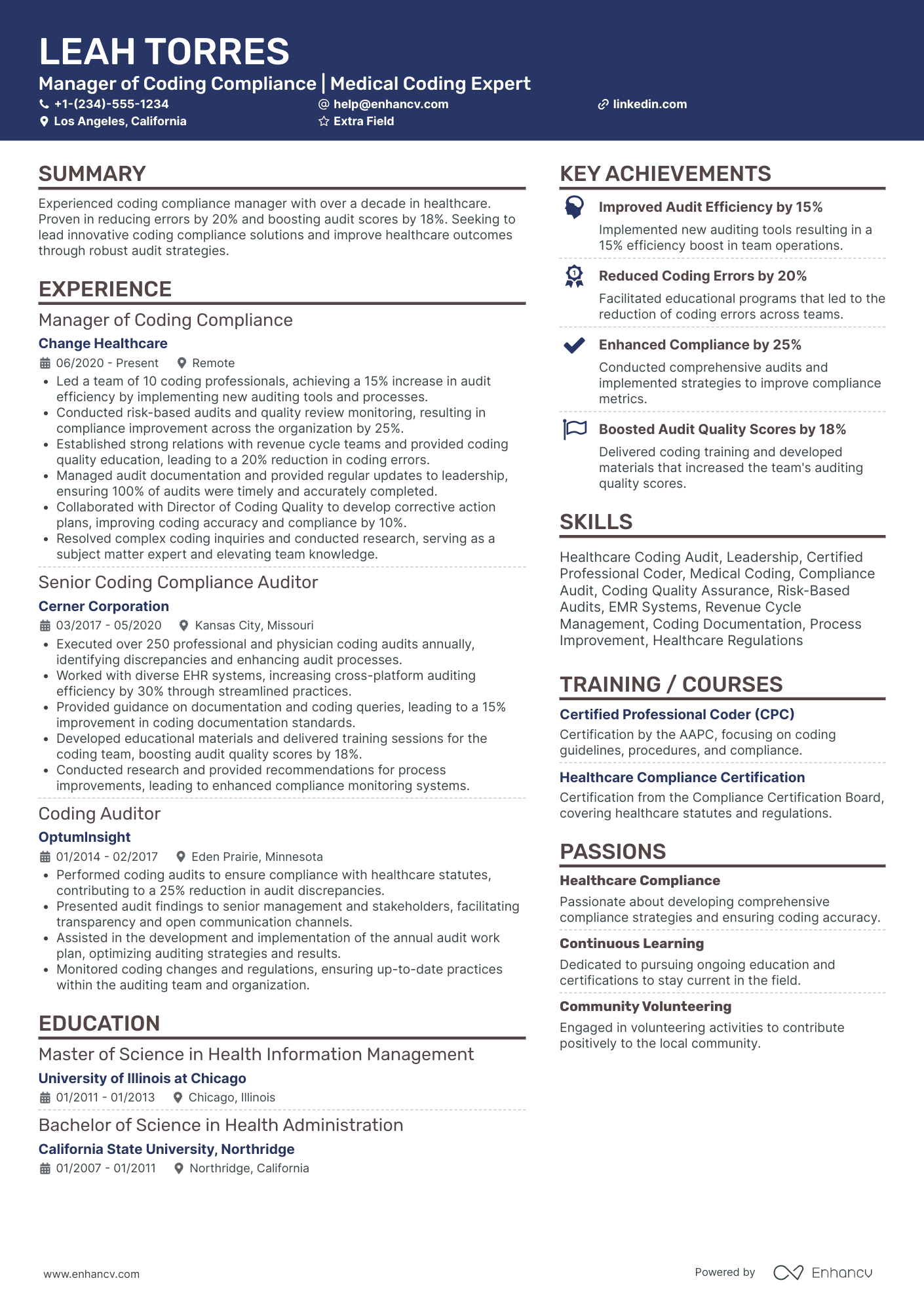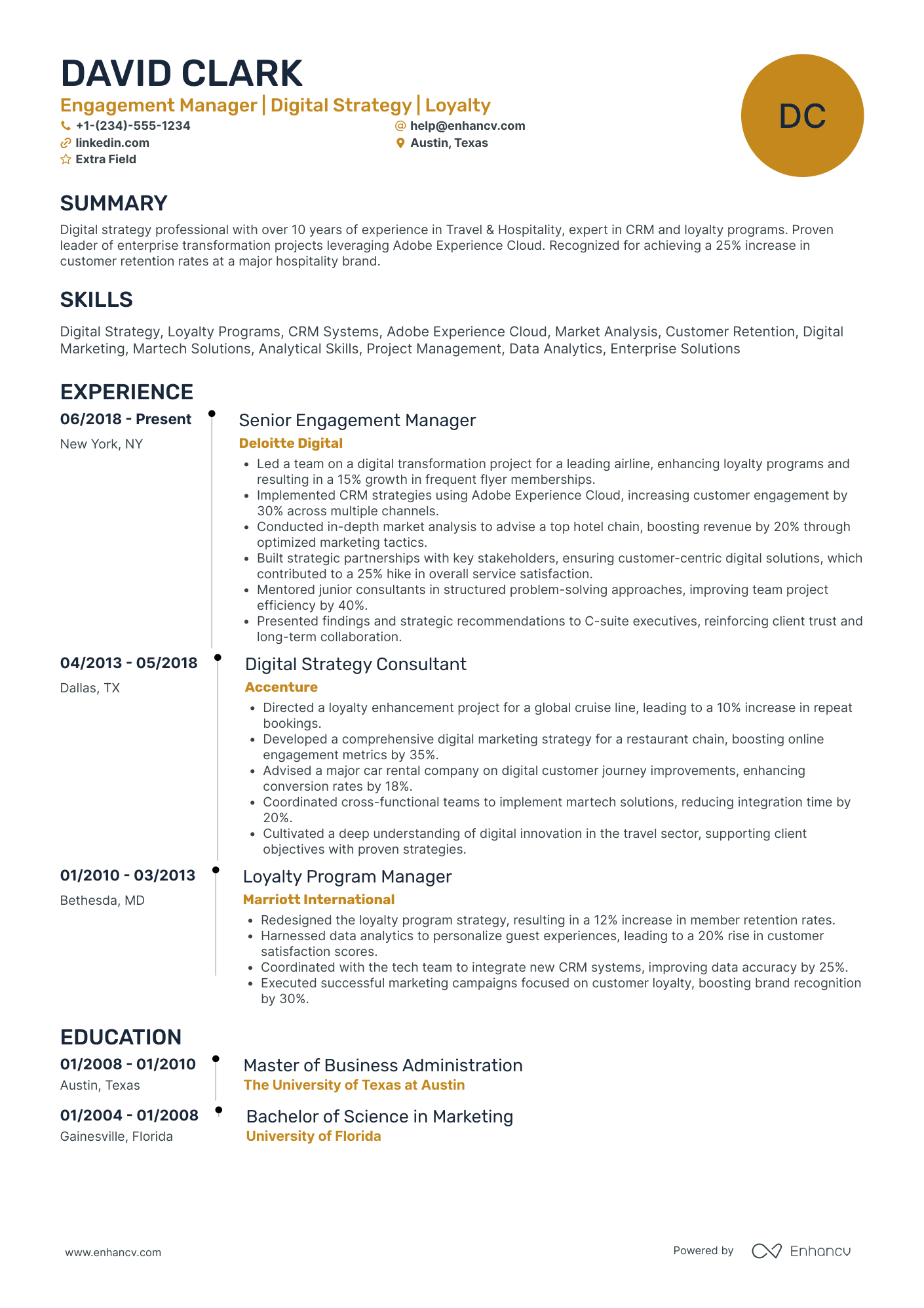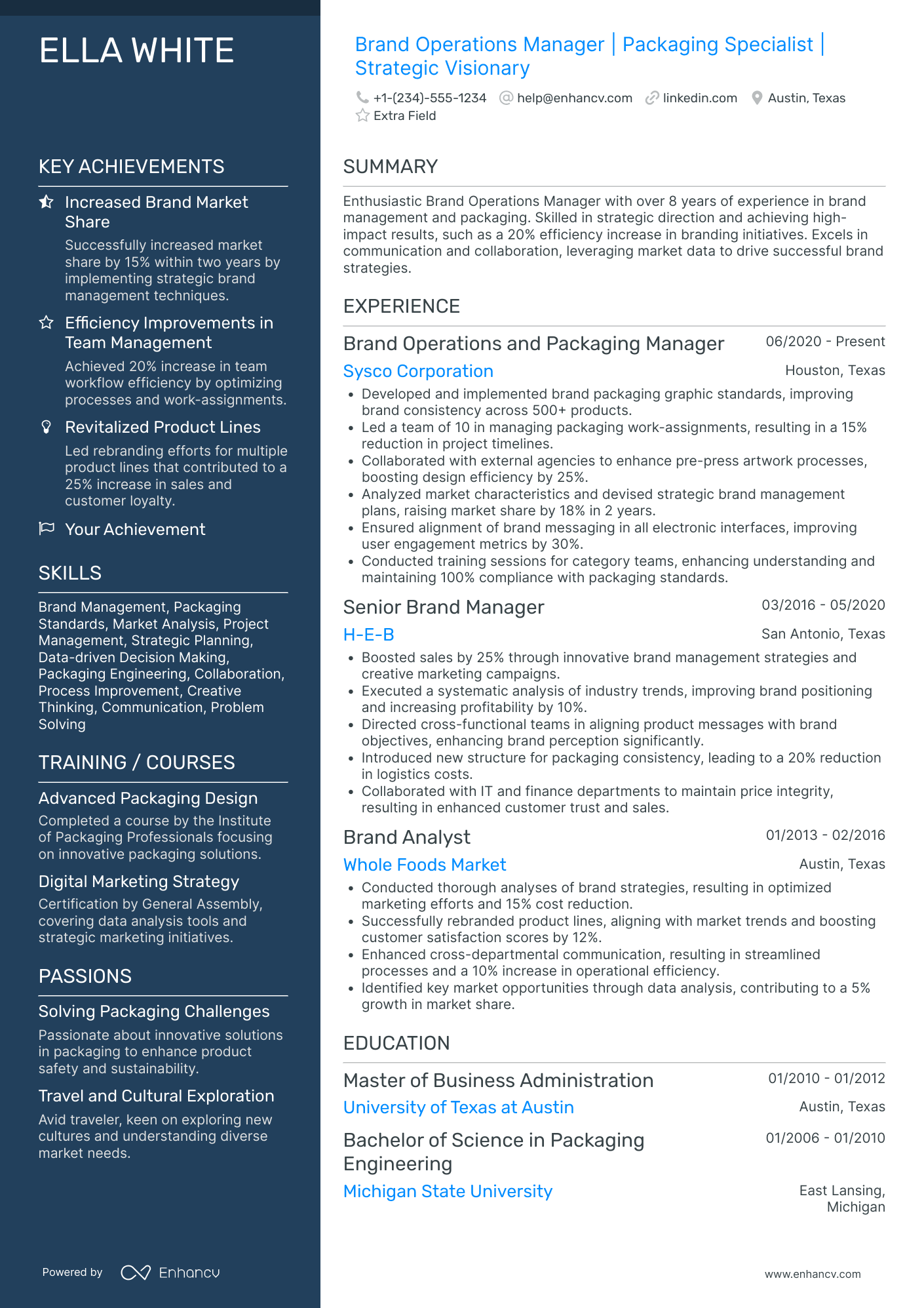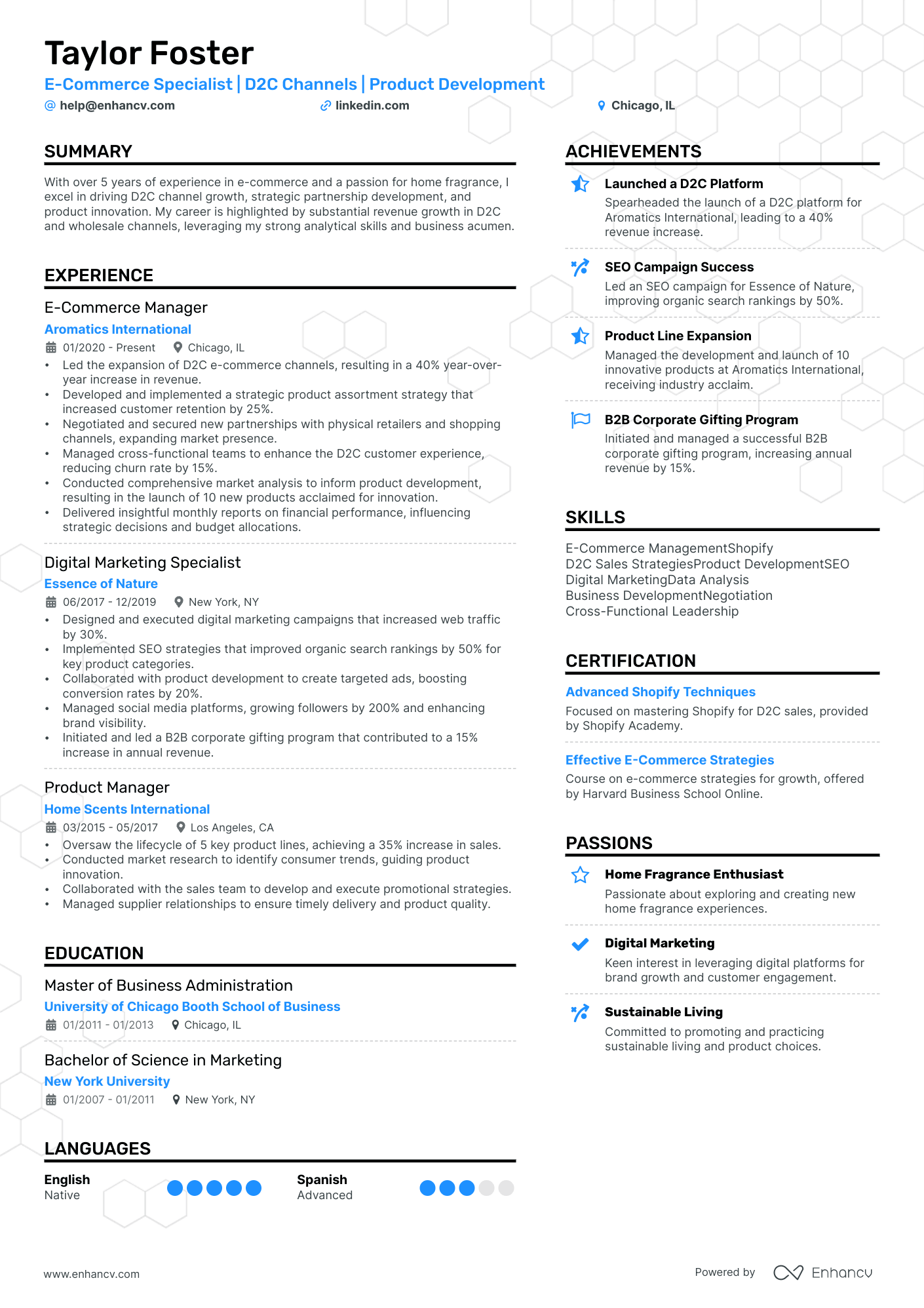As a brand manager, you will wear many different hats. You have your creative thinking cap, a fancy leadership hat with a bright feather, and many other technical and business-related hats that come in a wide range of colors and styles.
If you are looking for a new position as a brand manager and need help creating a professional resume, you are in the right place. This guide will show you how to create a compelling brand manager resume for those with several years of experience and job candidates who are looking for their first manager position.
We will go over the unique challenges brand managers face when building a resume. These challenges include:
- Demonstrating a mix of creative, technical, and business skills
- Quantifying their achievements that reflect improvements in brand awareness
- Tailoring the resume to a specific industry or job post
- Highlighting leadership abilities
- Indicating they are up-to-date with new design and business tools, cloud-based platforms, and branding strategies
We use real-world resume examples to show how you can create a properly formatted resume for a brand manager that gets you noticed.
If a brand manager is not quite right for your career goals, we have other resume guides for similar roles that you can check out:
- Marketing Manager resume
- Google Product Manager resume
- Digital Marketing Manager resume
- Public Relations Manager resume
- Communications Manager resume
Before we get into it, let’s review a real-world brand manager to give you an idea of what your resume can look like.
Brand Manager Resume Example
Taylor uses each section to its full potential by including industry-related keywords that reflect the skills and knowledge for the job. He takes full advantage of the header and summary sections and includes several keywords that recruiters and applicant tracking systems search for.
Notice how he lists “Home fragrance enthusiast” under the Passions section, which backs up his work experience in the fragrance industry. This is a great example of how you can tailor each section to the specific industry you are in.
Here are some more ways of how Taylor created an impressive resume:
- Tailored experience and achievements: The resume effectively highlights specific accomplishments relevant to the e-commerce and product development fields, such as leading a D2C platform launch that resulted in a 40% revenue increase and managing the development and launch of 10 innovative products. This focus demonstrates the candidate’s direct impact on business growth and product innovation.
- Quantifiable results: Many bullet points provide quantifiable results, such as a "40% year-over-year increase in revenue" and "SEO strategies that improved organic search rankings by 50%." These metrics offer concrete evidence of the candidate’s contributions and skills, making the resume more compelling and credible.
- Relevant skills and certifications: The resume lists skills and certifications directly relevant to the role of an e-commerce specialist, such as "E-Commerce Management," "SEO," "Digital Marketing," and "Advanced Shopify Techniques." Highlighting these areas shows the applicant’s commitment to professional development and expertise in key aspects of the role.
You can see how using a two-column format works well for someone with many years of experience and an abundance of technical, business, and creative skills.
To get your resume looking like this example, you first need to format it to meet industry standards.
How to Format a Brand Manager Resume
Formatting your resume today is more about having the right sections and an eye-pleasing design than having to set the correct margins, line spacing, and font size. All of these settings are a standard document format for most word-processing programs.
Today, most resumes you see use a single or two-column format. Which one should you choose? When thinking about the design of your resume, consider the following:
- The maximum page length for all resumes is two pages
- A two-column layout allows for more information on a single page
- Applicant tracking systems (ATS) accept two-column formats
brand managers will have 5-10 years of relevant work experience that they can put on their resume. A two-column format is more suited for candidates with a long work history and a plethora of technical, business, and creative skills.
Of course, the layout of your resume is your choice. Play around with both single and double-column resumes to see which one you like the most.
Whichever layout you decide to go with, be sure to save your resume as a PDF document (.pdf) unless they ask for a specific document type. A PDF document preserves the look of your resume no matter what operation system or screen size they use.
Choosing the right brand manager resume font
Did you know that there are over 200,000 different fonts that you can use? Before you begin to panic, most of those fonts are unusable for resumes. The best type of font you want to use for your resume or other professional document is a serif or sans serif font. These fonts include the classics Arial, Courier, and Times New Roman. The total number of these fonts is a more reasonable 450.
Serif and sans serif fonts have a more modern, contemporary look and are more widely used today. Enhancv resume templates come with a number of modern, sans serif fonts, like Volkhov, Rubix, Exo 2, Lato, Raleway, and Montserrat.
Different markets have specific resume formats – a Canadian resume could vary in layout.
Is your brand manager resume ready to go? Before sending it out to recruiters and hiring managers, run it through our resume checker for an in-depth analysis and tips on improving it.
Here are the five main resume sections that you want to include:
The top sections on a brand manager resume:
- Header: Include your full name, job title, current phone and email, and a professional social media or portfolio link.
- Resume summary/objective: A brief career summary or objective that highlights industry-specific skills and passion for brand management.
- Resume experience: A detailed list of past work experience that reflects the creative, technical, and business skills of a brand manager.
- Education: Include all post-secondary education along with certifications to show advanced learning.
- Hard and soft skills: A comprehensive list of technical skills and personal strengths that relate to brand management, creative design, and leadership.
Your resume will contain additional sections where you can list more of your skills. We will go over these sections a little later on.
To give you an idea of what you should add to your resume, here are the types of details that hiring teams want to see from an experienced brand manager:
What recruiters want to see on your resume:
- Relevant experience: brand managers are necessary in all major industries. Recruiters want to see work experience within the same industry, like gaming, medical device sales, or skin and beauty products.
- Quantifiable achievements: It will be easier for recruiters to get a clear picture of your abilities when you include dollar amounts and percentages when talking about increasing sales, market expansion, and other quantifiable metrics.
- Knowledge of current trends: You need to show a firm grasp of current market trends and brand awareness to demonstrate your ability to stay ahead of new trends and customer wants.
- Leadership and collaboration: Managing diverse teams is an essential skill for brand managers who must coordinate multiple teams of designers, copywriters, ad reps, accountants, and CEOs.
- Brand and customer awareness: A deep understanding of the brand and how customers decide between products is essential for increasing brand recognition and market reach.
Now, it’s time to add your relevant brand management work history to your resume. If you are applying for your first managerial role, we will show you how to add relatable work experience that reflects the skills a brand manager needs later on.
How to Write Your Brand Manager Resume Experience
You will dedicate the bulk of your resume to your past work experience and what you accomplished during that time. This section can do a lot to paint a picture of a successful brand manager, yet many job seekers fail to detail this section correctly.
The resume experience section should do more than list the job duties. It should tell anyone reading it how your work led to increases in brand awareness and market shares, a reduction in production costs and time to market, and how well you manage a diverse group of people.
How many past jobs should you add? Since we want to stay within that two-page limit, you will list no more than three jobs in this section. Each entry should include:
- Job title
- Company name, location, and industry
- Dates of employment
- Concise details of relevant duties, responsibilities, and accomplishments
For each job you list, include between 4 and 8 bullet points.
To show your career progression, list all past work experience in reverse chronological order. This is the standard way to list all work history and education for all resumes.
For all you visual learners out there, let’s take a look at a real-world brand manager resume experience example to give you an idea of the best way to format this section:
- •Managed new body care product development from scratch to commercialization
- •Created a launch plan and digital campaigns on the company's social media page, including posts and promotions
- •Managed brands in 43 showrooms across the United States
- •Launched 7 brand initiatives that led to a significant increase in brand growth
- •Other duties as assigned by CMO
When you read this resume experience example, do you get a sense of their accomplishments and how they benefited the company? Put yourself in the recruiter's shoes. Would you want to hire this person or continue looking for someone better?
What this example shows is a good attempt at demonstrating job performance but fails to show any actionable results. This does nothing to indicate they have the ability to analyze market data and develop effective campaigns to increase profits and expand the company's market reach and customer base.
Another critical component of this section is including a brief description of the company or industry. Without this information, hiring teams have no way of knowing if they have specific industry experience to do the job well.
We can assume this company is in the health and beauty industry from the bullet points, but you know what can happen when people assume. Take full advantage of this section by including all necessary information.
Let’s try reworking this example and see if we can make it sing:
- •Managed 48 new body care product development from scratch to commercialization, leading to items being ranked in the company's top 5 most profitable products of 2013
- •Created a launch plan and 15 digital campaigns on Facebook and Instagram, including posts and promotions, and grew the fan base from 25K to 89K within 5 weeks
- •Managed $95M in brands in 43 showrooms across the United States
- •Launched 7 brand initiatives that delivered $45M in NPV, and +$91M in revenue, representing a +12% brand growth
- •Managed 3 content creation teams to develop new content for print, social media, radio, and televison
See how adding a little more detail can greatly improve your resume? Now we have the answers to several questions that help determine if this person qualifies for the job:
- What type of industry/company: Health and wellness
- Did they demonstrate an increase in sales or market reach: “+$91M in revenue/ +12% brand growth”
- Did they work to expand the company customer base: “grew the fan base from 25K to 89K within 5 weeks"
- Do they demonstrate leadership abilities: “Managed 3 content creation teams”
I say this example does a much better job of selling this person’s ability and will more than likely lead to an initiation to interview.
How to quantify impact on your resume
You can see how adding numbers and percentages to the resume experience section can take your resume from humdrum to something that excites HR teams and recruiters.
There are several metrics that brand managers can quantify on their resumes that clearly demonstrate their ability to increase brand recognition. To give you some ideas of how you can do this, here are some more real-world examples of how brand managers are quantifying key metrics:
- Revenue growth: “Designed and optimized a digital marketing campaign on Google Adwords, which led to a 20% increase in ROI.”
- Market share increase: “Analyzed market trends and competitor activities to identify growth opportunities, leading to a 28% increase in market expansion.”
- Cost reduction: “Implemented QA procedures in campaign production, which decreased design and copywriting errors by 25%.”
- Brand awareness expansion: “Led a team of marketing specialists to develop and implement innovative marketing campaigns, resulting in a 30% increase in brand awareness.”
- Increase in customer engagement: “Performed market analysis on customer trends and implemented targeted email campaigns that increased time on page by 33% and grew customer base by 15%.”
- Campaign performance: “Launched and sustained all marketing efforts for Nike’s first basketball concept stores, “House of Hoops” in Harlem, Los Angeles, and Chicago, which posted an average 35% increase in sales YoY.”
- Product launches: “Launched 13 company-firsts in e-commerce strategies, generating $28M in annual sales consecutively for 2 years.”
- Leadership: “Inspired and mentored a 40-member sales & marketing team into top performers and brand advocates, which translated to a 10% improvement in satisfaction score and 55% customer engagement score.”
In addition to quantifying your impact in the resume experience section, you can also do this in your resume summary, which we will talk about in a little while.
How do I write a brand manager resume with no experience
Even the most seasoned brand managers once stood on the sidelines shouting, “Put me in, coach! I’m ready to play.”
If you are applying for your first brand manager job, this section is for you.
To showcase your potential to be a brand manager, you need to list those jobs in which you have experience with:
- Brand strategy development
- Market research
- Cross-functional collaboration
- Product development
- Relationship management
- Analytics and reporting
- Team leadership
Do not include any job where you did not perform the duties or skills a brand manager needs.
Including relevant keywords and phrases from the job post
One last note about adding details to the resume experience section.
When adding your work details, you want to study the job description and look for relevant keywords and phrases such as:
- Brand marketing
- B2B
- B2C
- Written communication
- Solutions-oriented
Companies who use applicant tracking systems carefully craft each job post to include specific keywords and phrases that relate to the required skills. This program will search your resume for those skills and score you on how many you include.
For example, here is a recent job post for a brand manager position for Dillard’s beauty brand:
Some of the keywords and phrases you can add to your resume from this job post are:
- increased sales
- Drive brand sales
- consistent brand growth
- teaching product knowledge
- Strong interpersonal skills
- Leadership
- Resourceful
- adapt quickly to changing priorities
- Resourceful self-starter
Next, we will go over adding technical, business, and personal skills that are essential for a brand manager.
How to List Your Hard Skills and Soft Skills on Your Resume
The resume skills section of your brand manager resume is where you can list skills from the job description and other skills that you have.
What are hard and soft skills? Hard skills define your business and technical abilities, like using CRM software, analyzing market and customer trends, and experience with industry-related software.
Soft skills cover personal skills like emotional intelligence and having an eye for design. They help managers be effective negotiators and allow them to come up with unorthodox solutions to complex problems.
This section allows brand managers to showcase all of their technical, business, and personal skills in an easy-to-read format.
Enhancv Technical Skills section is the best place to list your hard skills:
Best hard skills for your brand manager resume
- Market research and analysis
- Brand strategy development
- Marketing campaign management
- Digital marketing
- Data analysis and reporting
- Project management
- Creative development
- Budget management
- Customer relationship management (CRM)
- Product development
- Key performance indicators (KPI)
- Integrated marketing communications
- Brand development
- Content marketing
When adding your brand manager resume soft skills, use our Strengths and Passion sections to include the following skills:
Best soft skills for your brand manager resume
- Communications
- Time management
- Emotional intelligence
- Creativity and innovation
- Strategic thinking
- Flexibility and adaptability
- Interpersonal skills
- Attention to detail
- Conflict resolution
- Customer-driven empathy
- Multi-tasking
- Networking
- Leadership
- Teamwork
- Resilience
- Passionate learner
Creating a targeted resume is the best way to get noticed. Add those skills that are listed in the job post first, then include any additional skills that can benefit a brand manager. Be sure to write these skills as they appear in the job post.
In this next section, we will talk about adding your education, which you must include regardless of your years of experience.
How to List Your Certifications and Education on Your Resume
Listing your post-secondary education on your resume shows potential employers you have a solid foundation of skills and education to do the job well. Even if you graduated way back in the 1980s, you still want to include all post-secondary education.
When adding your education details, you want to list:
- Degree name
- School name and location
- GPA
- Dates of enrollment/graduation date
There is a significant number of companies that require their brand managers to have an MBA. If you have multiple degrees, you can list both in one section, like so:
Future brand managers who are working on gaining real-world experience can add course details to each entry to highlight the skills they’ve learned.
When adding your education, remember to list them in reverse chronological order.
If you are looking to increase your skills and earning potential, consider enrolling in these certificate programs:
Best certifications for your brand manager resume
The last main section of your resume is one of the first things recruiters will read. This is one section that you can tailor to the job post to increase your chances of getting noticed.
How to Write Your Brand Manager Resume Summary Or Objective
The way you write this section will depend on how many years of experience you have as a brand manager or in related positions.
The resume summary is for experienced job candidates with 5 or more years of experience within the same industry. You summarize your career so far using specific keywords and actionable numbers to demonstrate how you can benefit the company.
A resume objective is for job seekers who are fresh out of college and looking to build enough experience to become a manager and for older job seekers who are switching careers. They list their career objectives and plan of action for reaching their goals.
Since brand managers need a minimum of 3-5 years of relevant experience, we will use a real-world resume summary example to show you the best way to write this section.
This section is easy to write if you know what you want to get across. This section should clearly state the following:
- Number of years of experience
- Type of industry
- Percentages and total dollar amounts to indicate accomplishments
Let’s try this again:
You can see how adding specifics to this section can greatly improve it. Without having to read any further, we know this person has:
- Over 7 years of retail brand experience
- Has a positive track record of proven results
- Received an award for their achievements
Pretty impressive, don’t you think? Did you notice this line, “Eager to support Nike with…”
This is an excellent tactic for showing you are sending a tailored resume specifically for them. That little bit of extra detail can go a long way toward impressing your future employer.
Optimize your resume summary and objective for ATS
Drop your resume here or choose a file.
PDF & DOCX only. Max 2MB file size.
Additional Sections for a Brand Manager Resume
To round out your resume, you want to include any details that contribute to your stellar branding and management style.
There are several different types of sections that you can add, such as:
- Awards and recognitions: brand managers who excel at their jobs are often recognized locally or nationally. Including this section demonstrates your award-winning performance and can lead to companies competing with each other to have you work for them.
- Key achievements: Including successful product launches that include quantifiable metrics shows that you have the drive to reach strict deadlines based on market trends.
- Spoken languages: This section can come in handy if the job works with people from different countries.
- Membership in professional associations: Listing memberships in national and local associations and networking groups shows employers you are engaging with others in the industry and staying current with new trends and customer needs.
Enhancv has several custom resume sections where you can add more details about your work style and experience.
For instance, brand managers need to excel in time management and organization. Our Day in a Life section is a great way to show how you organize your day:
Our Passion section is another way you can include the reason why you would make a great brand manager:
These sections fit perfectly as a side column in a two-column resume format.
There is one more section that brand managers can add to their resumes if they have published any industry-related articles or books.
Adding publications to your brand manager resume
If you do a Google search for books and articles on brand management, you will find a long list to search through. Having published articles and books on brand management techniques and tactics shows that you are an expert in the field and are recognized for that expertise.
If you are thinking about writing a book on brand management, some of the top subjects to write about include:
- Brand development
- Consumer behavior insights
- Sustainability and social responsibility
- Collaboration
- Influencer marketing and partnerships
Key Takeaways
Having a well-formatted brand manager resume is the first step in getting your foot in the door and making a good first impression. Think of your resume as the initial handshake when meeting someone new. You want to be firm and instill confidence in whoever is reading it.
During this journey toward a better brand manager resume, we discussed how you can:
- Properly format your resume using a single or two-column format
- Create a targeted resume based on keywords and phrases in the job post
- Quantify specific metrics using numbers and percentages
- Showcasing a mix of technical, business, and creative skills
- Improve your chances of creating a resume that stands above the rest
Brand Manager resume examples
By Experience
By Role
